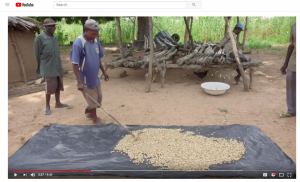Farmers in places where aflatoxin contamination is a problem are more likely to dry crops on tarps – one of the simplest prevention methods — if they are given the tarp, rather than having to buy it.

A series of videos describing the findings of a randomized controlled trial (RCT) tell that lesson and others to farmers, producers and researchers.
The project – led by the Peanut & Mycotoxin Innovation Lab, International Food Policy Research Institute (IFPRI), and University for Development Studies in Ghana – found farmers trained on recommended practices likely would change the way they do things. Whether they would invest in a structural change, such as using a tarp or drying machine, depended on economic incentives and their location.
Based on the findings, videos were produced in English and Gonja, a language in the Ghana’s groundnut-growing north, to explain to farmers and processors the problem of aflatoxin, how to reduce contamination in crops and market opportunities available for aflatoxin-safe nuts.
Researchers have shared the videos with NGOs and civil society organizations in Ghana’s peanut-growing regions. They also plan farmer screenings using tablets or smartphones and outreach to the Ministry of Agriculture and local government officials. The videos are also available on the PMIL website and YouTube channel.
Funding for the RCT was provided by the PMIL (a Feed the Future program of the U.S. Agency for International Development) and the CGIAR Research Program on Agriculture for Nutrition and Health (A4NH). Support for video production was provided by USAID. Additional dissemination efforts were funded by the Netherlands Ministry of Foreign Affairs.